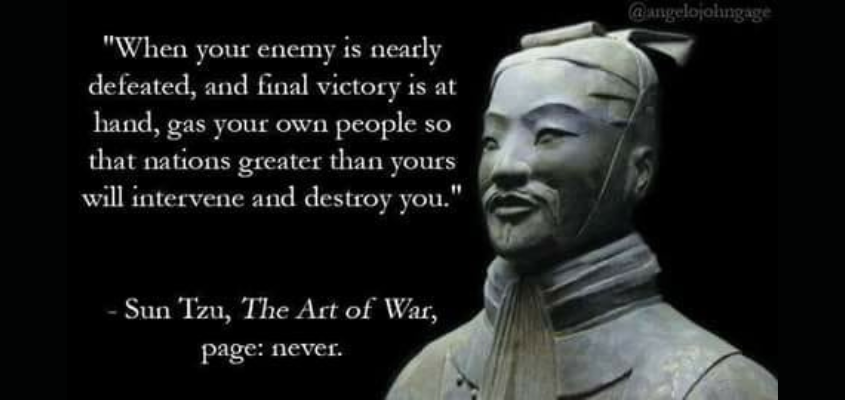
2018 meme debunking accusations of chemical weapons use by Syria. Image: @angelojohngage
The chemical weapons charge was used over and over again and each time the version of events strained credulity. In 2018 the U.S., France, and the U.K. declared they would take military action against Syria if there were any chemical weapons attacks. Like clockwork, on April 7 of that year, 40 civilians were killed in the city of Douma and it was reported that the Syrian government had dropped chemical weapons on the building where the killings took place. But one inspector from the Organization for the Prohibition of Chemical Weapons (OPCW) cast doubt on that version of events. A leaked document stated, “…there is a higher probability that both cylinders were manually placed at both locations rather than being delivered by aircraft.” The whistleblower disappeared from corporate media accounts, while the likelier explanation that civilians were kidnapped and killed by U.S. proxies, was sent down the memory hole.
Consider the odd timeline of events that year. On March 4, a former Russian double agent Sergei Skripal and his daughter were poisoned by a chemical agent in Britain. The British government blames Russia, which has no reason to harm a former spy they swapped eight years prior. Saudi Arabia’s de facto ruler, crown prince Mohammed bin Salman, arrived in London for an official visit on March 7. On March 12, French president Emmanuel Macron stated that France would attack Syria if any chemical weapons are used there. The next day the Russian military claims to have evidence that a chemical attack will be carried out against Syrian civilians as a pretext for war. On March 16 France warned French journalists to leave Syria. Mohammed bin Salman traveled to Washington on March 19. On April 8 the prince known as MBS went to Paris for yet another official visit. On that day Saudi funded jihadist groups and the White Helmets, who were created by a British intelligence officer, reported that a chemical weapons attack occurred in the city of Douma. On April 14, the United States, France and Britain joined in a missile strike against Syria.
Consider the odd timeline of events that year. On March 4, a former Russian double agent Sergei Skripal and his daughter were poisoned by a chemical agent in Britain. The British government blames Russia, which has no reason to harm a former spy they swapped eight years prior. Saudi Arabia’s de facto ruler, crown prince Mohammed bin Salman, arrived in London for an official visit on March 7. On March 12, French president Emmanuel Macron stated that France would attack Syria if any chemical weapons are used there. The next day the Russian military claims to have evidence that a chemical attack will be carried out against Syrian civilians as a pretext for war. On March 16 France warned French journalists to leave Syria. Mohammed bin Salman traveled to Washington on March 19. On April 8 the prince known as MBS went to Paris for yet another official visit. On that day Saudi funded jihadist groups and the White Helmets, who were created by a British intelligence officer, reported that a chemical weapons attack occurred in the city of Douma. On April 14, the United States, France and Britain joined in a missile strike against Syria.